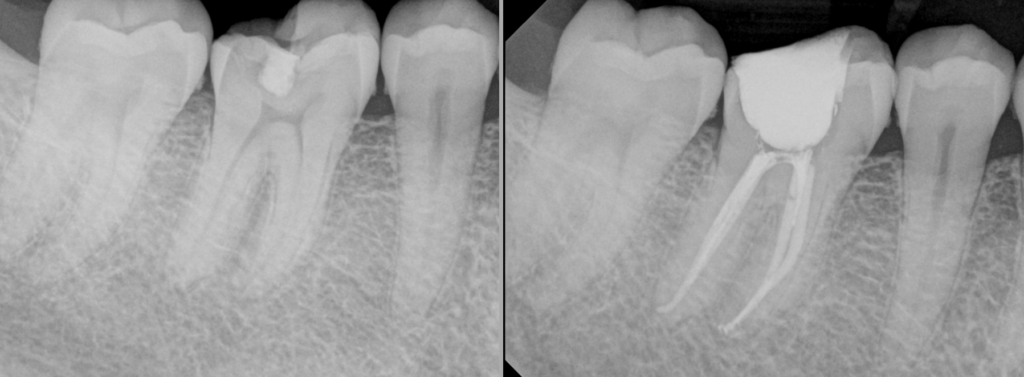Your teeth are meant to last a lifetime. Years ago, diseased or injured teeth were usually pulled. But today, a tooth can often be saved through root canal therapy.
What is a Root Canal?
Root canal therapy will correct disorders of the pulp of the tooth that is inflamed, infected, or dead. Your endodontist will remove the damaged tissues from inside the tooth and replaces them with permanent dental material.
It’s very similar to a routine filling and can usually be completed in one or two appointments, depending on the condition of your tooth and your personal circumstances. Getting a root canal is relatively painless and extremely effective. You’ll be back to smiling, biting and chewing with ease in no time.
Saving the natural tooth with root canal treatment has many advantages:
- Efficient chewing
- Normal biting force and sensation
- Natural appearance
- Protects other teeth from excessive wear or strain
Yes! Usually, root canals are recommended or needed when there is an infection deep within the tooth. You will want to have it done as soon as possible. Waiting too long for the procedure can make the infection worse. The infection can cause problems with the bone that holds the tooth. When that happens, it could be impossible to save the tooth. Infection in one tooth can also spread to the other teeth.
A tooth’s nerve and pulp can become irritated, inflamed, and infected due to deep decay, repeated dental procedures on a tooth, and/or large fillings, a crack or chip in the tooth, or trauma to the face.
Before starting the root canal, the dentist will numb the tooth with local anesthesia to ensure patient comfort. An opening is made through the top of the tooth and the pulp is removed from the chamber and canals. The pulp along with bacteria, the decayed nerve tissue, and related debris is removed from the tooth. The cleaning out process is done by using root canal files. A series of these files of increasing diameter are each subsequently placed into the access hole and worked down the full length of the tooth to scrape and scrub the sides of the root canals while periodically flushing away the debris. The damaged tissues from inside the tooth will then be replaced with permanent dental material.

How do I care for my teeth afterwards?
Root-treated teeth should be looked after just the same as any other tooth. Remember to clean your teeth last thing at night and at least one other time during the day, with a fluoride toothpaste. Cut down on sugary foods and drinks, and have them only at mealtimes if possible. See your dental team as often as they recommend for regular check-ups.
Takeaway
Root canal treatments are carried out millions of times each year. In most cases, endodontic treatment can successfully save a tooth that has been infected or damaged.
New technologies and anesthetics help to ensure that a root canal procedure is as comfortable as possible. People who experience severe or lasting pain should report it to the endodontist for further evaluation.
